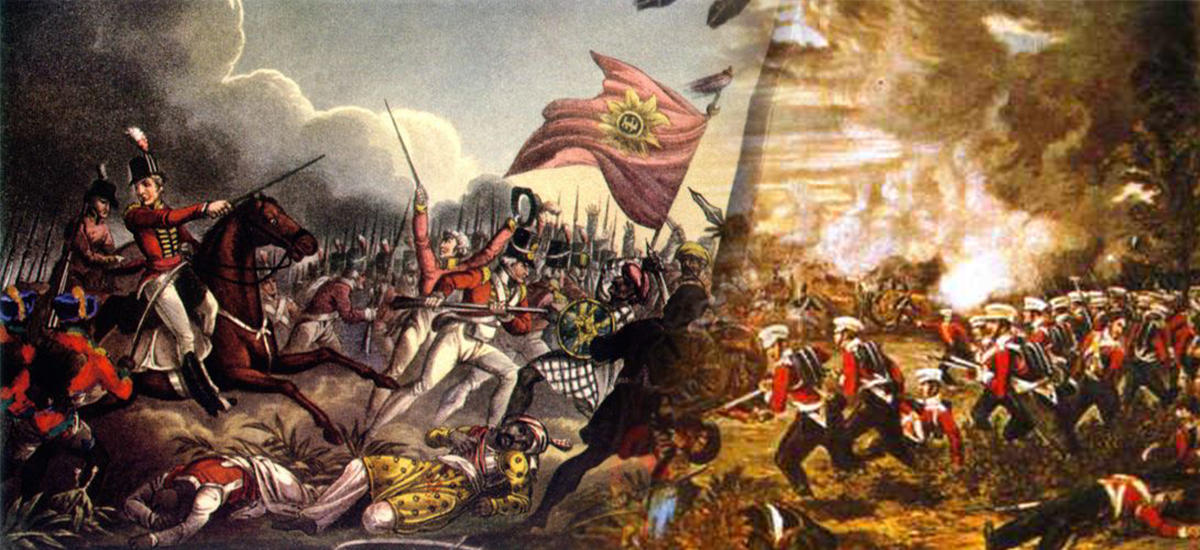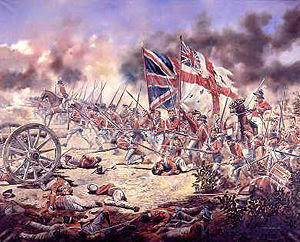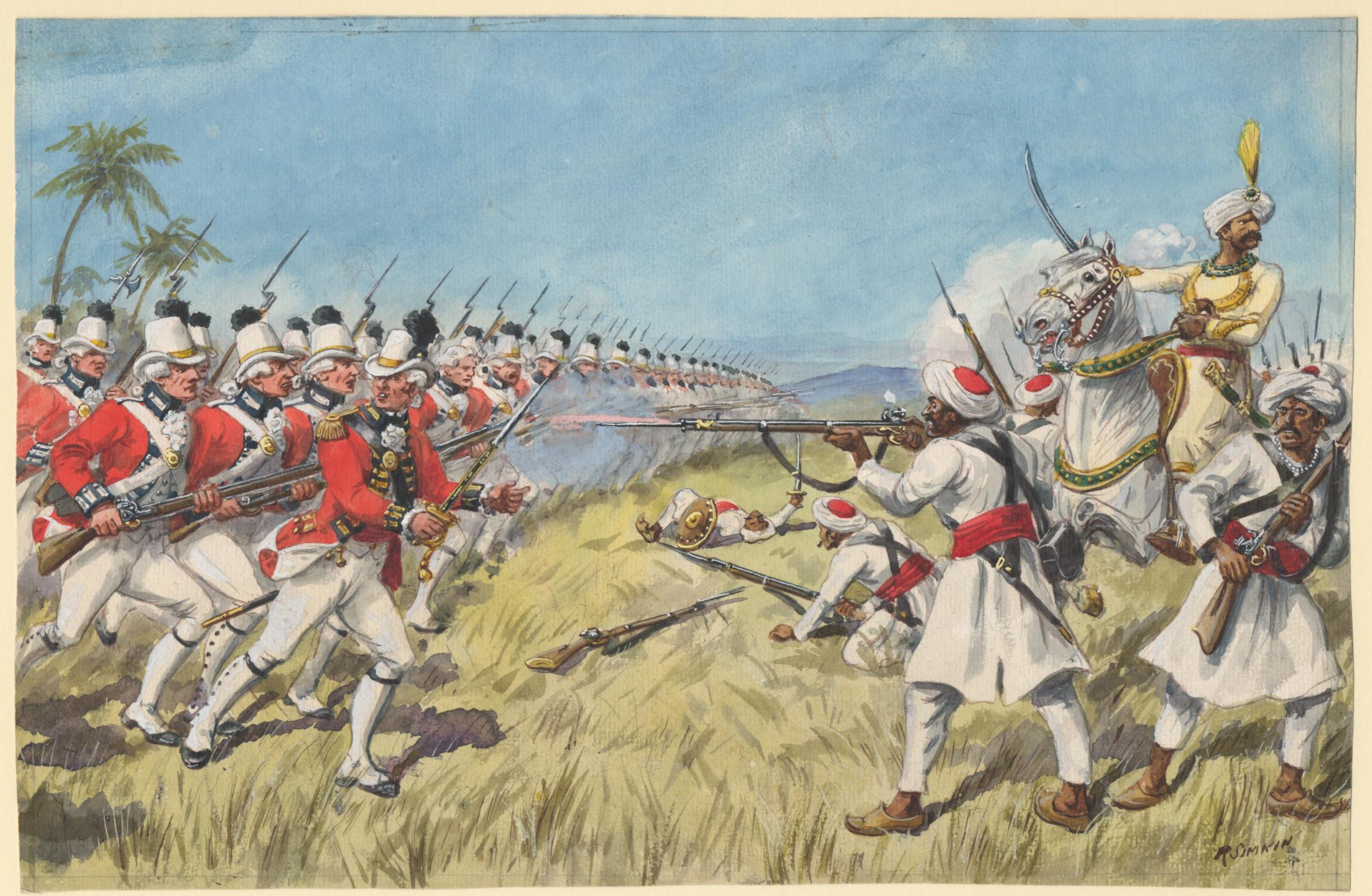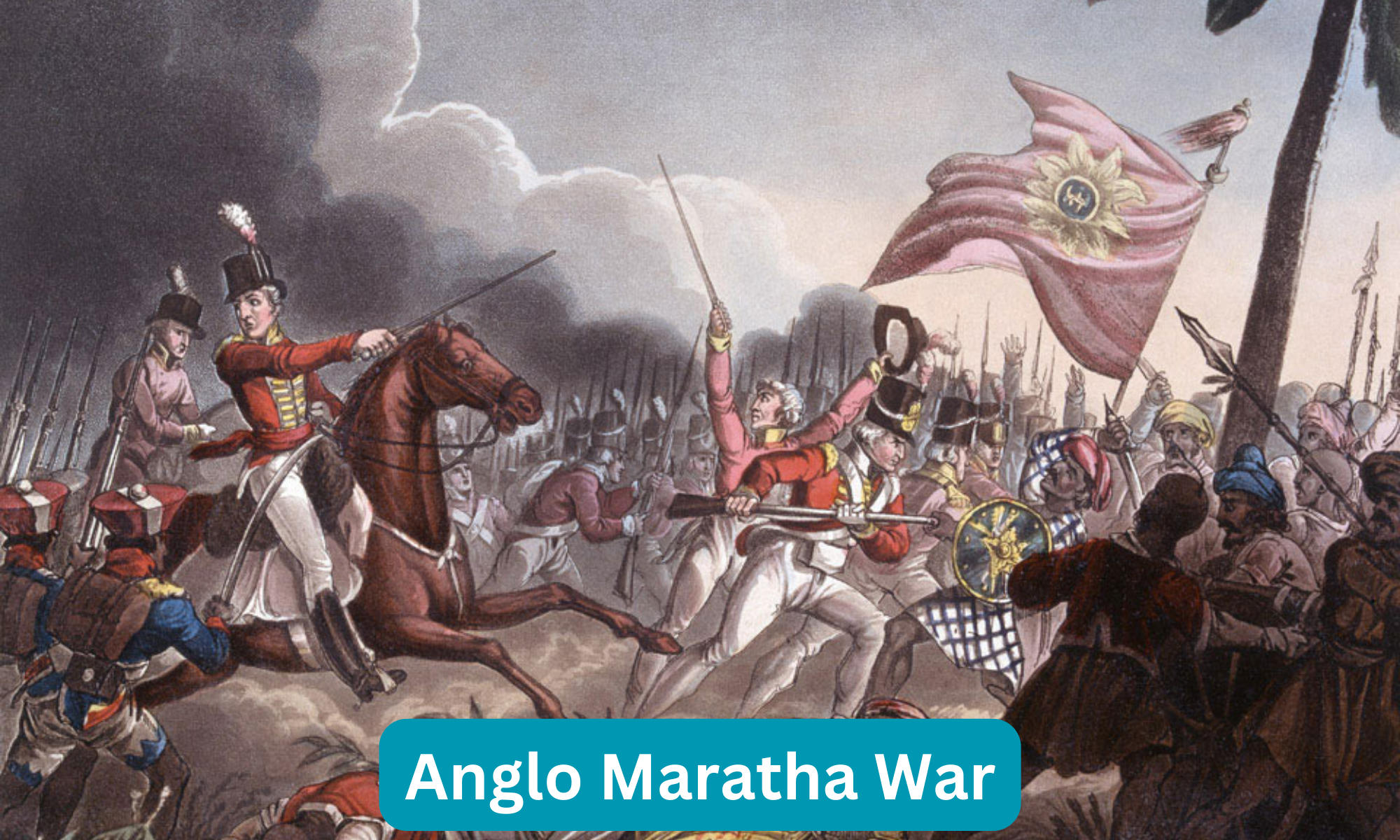Table of Contents
Anglo Maratha War
The Anglo Maratha War was a series of conflicts between the British East India Company and the Maratha Empire in India during the late 18th and early 19th centuries. These wars occurred in multiple stages and ultimately led to the defeat of the Maratha Empire and its subsequent annexation by the British.
The Maratha Empire, established by the renowned warrior king Shivaji Maharaj, was one of the largest and most powerful empires in 18th-century India. It encompassed a significant portion of western and central India and was renowned for its warrior culture and skilled cavalry, which provided them with an advantage on the battlefield.

First Anglo Maratha War
The First Anglo-Maratha War was fought between the British East India Company and the Maratha Empire, which was one of the most powerful empires in India during the 18th century. The war lasted from 1775 to 1782 and was one of the significant events that led to the British colonization of India.

First Anglo Maratha War: Background
The Maratha Empire, which was established by Shivaji in the 17th century, was one of the largest empires in India. The Maratha armies had defeated the Mughals and other regional powers and had established their control over most parts of India. The Marathas were known for their military prowess and their ability to wage guerrilla warfare, which made them a formidable force to reckon with.
First Anglo Maratha War: Causes of the War
The British East India Company established its trading posts in India during the early 17th century. The British had gained a foothold in India by making alliances with regional powers and by using their superior military technology to defeat their enemies. By the mid-18th century, the British had established their control over most parts of Bengal, Bihar, and Orissa.
First Anglo Maratha War Course of the war
The conflict between the British and the Marathas started when the British East India Company decided to interfere in the internal affairs of the Maratha Empire. The British had made an alliance with the Raja of Nagpur, who was a vassal of the Maratha Empire. The Raja of Nagpur had rebelled against the Maratha Emperor, and the British had promised to support him.
The Marathas, who considered the Raja of Nagpur as their vassal, saw the British interference as a direct challenge to their authority. The Maratha Empire had a policy of non-interference in the affairs of their vassals, and the British East India Company’s actions were seen as a violation of this policy.
The Maratha armies, led by their most capable generals, launched an attack on the British forces. The Marathas were initially successful in their campaign, and they were able to capture several British forts and trading posts. The British forces, which were poorly equipped and understaffed, were unable to withstand the Maratha attacks.
However, the British were able to turn the tide of the war by making alliances with other regional powers. The British were able to make an alliance with the Nizam of Hyderabad, who was the Maratha’s traditional enemy. The British were also able to gain the support of the Sikh Empire, which was emerging as a regional power during that period.
First Anglo Maratha War: Consequences of the war
The Marathas, who were facing a united front, were unable to continue their campaign. The British forces, which were now better equipped and had received reinforcements from England, were able to launch a counter-attack. The British forces were able to recapture most of the forts and trading posts that they had lost during the initial phase of the war.
The war ended in 1782, with the signing of the Treaty of Salbai. The Marathas were forced to cede several territories to the British, and the British were recognized as the dominant power in India. The war marked the beginning of the British colonization of India, which would continue for the next two centuries.
End of First Anglo Maratha War: Treaty of Salbai
The Treaty of Salbai was signed on May 17, 1782, between the Maratha Empire and the British East India Company. It marked the end of the First Anglo-Maratha War, which had started in 1775.
- The Maratha Empire was a powerful Hindu empire that dominated most of India during the 18th century.
- The British East India Company, on the other hand, was a trading company that had established a strong presence in India, primarily in Bengal, Madras, and Bombay.
- The First Anglo-Maratha War had started because of territorial disputes between the two powers.
- The Marathas had expanded their territories into what the British considered their sphere of influence, and the British had responded by sending troops to counter the Maratha advances.
- The war had been fought on several fronts, with both sides winning and losing battles.
- By 1782, both sides were eager to end the war. The Marathas were facing financial difficulties, while the British were occupied with other conflicts, notably the American War of Independence.
- The two sides met in Salbai, near the city of Pune, to negotiate a peace treaty.
- The Treaty of Salbai was a significant achievement for the British. They were able to secure their territories in western India, including Bombay and Salsette.
- They were also able to secure trading rights in Maratha territories, which gave them access to valuable resources such as cotton and opium.
- In return, the British agreed to pay an annual tribute to the Maratha Empire, which was a sign of respect and recognition of the Marathas’ power.
- They also agreed to provide military assistance to the Marathas if they were ever attacked by a foreign power.
- The Treaty of Salbai was a turning point in the relationship between the Marathas and the British. It established a sense of mutual respect and recognition, which would shape their relationship over the coming decades.
- The treaty also had wider implications for India as a whole. It marked the beginning of the end of Maratha dominance in India.
- The Marathas had been weakened by the war and would go on to face further defeats at the hands of the British in subsequent conflicts.
- The British, on the other hand, had secured their position in western India, which would pave the way for their eventual domination of the entire subcontinent.
The First Anglo-Maratha War was a significant event in the history of India. The war was fought between two powerful empires, and it led to the emergence of the British as the dominant power in India. The war also demonstrated the superior military technology of the British and their ability to make alliances with other regional powers. The war was the first step in the British colonization of India, which would have a profound impact on the history of the subcontinent.
Second Anglo Maratha War
The Second Anglo-Maratha War was fought between the British East India Company and the Maratha Empire in India. The war lasted from 1803 to 1805 and was a significant turning point in the history of India.

Second Anglo Maratha War: Background
The Maratha Empire was a powerful Hindu empire that controlled most of the Indian subcontinent in the 18th century. The British East India Company, on the other hand, had established its foothold in India by the early 1700s, primarily through trade. The British were gradually expanding their influence and control over various regions of India, which threatened the Marathas.
The Marathas had suffered a major defeat in the First Anglo-Maratha War (1775-1782) and had lost most of their territories in the north. However, under the leadership of Peshwa Baji Rao II, the Marathas were able to regroup and regain much of their lost power by the early 1800s. Meanwhile, the British had consolidated their position in India and were looking to expand further.
Second Anglo Maratha War: Causes of the War
The main cause of the Second Anglo-Maratha War was the British desire to expand their territory and control over India. The British also wanted to end the Maratha threat to their power and influence in India. Another major cause was the rivalry and conflicts between the Maratha chiefs and the Peshwa, which weakened the Maratha Empire and made it vulnerable to British aggression.
Second Anglo Maratha War: Course of the war
The war began in 1803 when the British launched an attack on the Marathas. The British forces, led by Sir Arthur Wellesley (later known as the Duke of Wellington), were well-equipped with modern weapons and tactics, which gave them a significant advantage over the Marathas. The Marathas, on the other hand, relied on traditional warfare and were no match for the British forces.
The British were able to defeat the Marathas in several battles, including the Battle of Assaye and the Battle of Aragon. The Maratha forces were also weakened by the internal conflicts and rivalries among the Maratha chiefs. The Peshwa Baji Rao II was eventually forced to surrender to the British in 1804, effectively ending the war.
Second Anglo Maratha War: Consequences of the War
- The Second Anglo-Maratha War had far-reaching consequences for India.
- The Maratha Empire, which had once been one of the most powerful empires in India, was weakened and lost much of its territories to the British.
- The war also paved the way for British domination and control over India, which lasted for almost a century.
- The war also had significant political consequences.
- The Peshwa Baji Rao II was exiled to Bithur, where he later became a mentor to the young Indian nationalist leader, Nana Sahib.
- The war also contributed to the rise of the Indian independence movement, which aimed to end British rule in India.
In conclusion, the Second Anglo-Maratha War was a significant event in the history of India. It marked the beginning of British dominance and control over India and the weakening of the Maratha Empire. The war also had significant political consequences, including the rise of the Indian independence movement.
Third Anglo Maratha War
The Third Anglo-Maratha War was a military conflict that took place in India between the British East India Company and the Maratha Empire, which was one of the most powerful Hindu states in the Indian subcontinent during the early 19th century. The war began in 1817 and ended in 1818 with the complete defeat of the Marathas and the annexation of their territories by the British.

Third Anglo Maratha War: Background
The origins of the conflict can be traced back to the decline of the Maratha Empire, which had been weakened by a series of internal conflicts and external invasions. The British, who had already established their control over most of India, saw an opportunity to expand their territory and influence by taking advantage of the Maratha’s weakness.
Third Anglo Maratha War: Causes of the War
The British, under the command of General Sir Thomas Hislop, launched a series of attacks on the Maratha forces, which were initially successful. The Marathas, who were under the command of Peshwa Baji Rao II, were unable to resist the British assault and were forced to retreat. However, the Marathas soon regrouped and launched a counterattack, which resulted in a series of battles that lasted for several months.
Third Anglo Maratha War: Course of the war
The decisive battle of the war took place at Koregaon, where a small British force led by Captain Staunton, consisting of 800 soldiers, faced a Maratha army of 20,000 soldiers. Despite being vastly outnumbered, the British forces were able to repel the Maratha assault and secure a strategic victory. The battle of Koregaon is still celebrated as a symbol of resistance against oppression and caste-based discrimination in India.
The Marathas continued to resist the British advance but were gradually pushed back and forced to surrender. The Peshwa, who had initially sought British support against his rivals, was captured and exiled to Bithur, where he lived in exile until his death.
The aftermath of the war saw the complete annexation of the Maratha territories by the British. The Maratha Empire, which had once been one of the most powerful states in India, was reduced to a minor principality. The British also abolished the Peshwa system and established a new administration in the region.
Third Anglo Maratha War: Consequences of the War
The Third Anglo-Maratha War was significant in that it marked the end of the Maratha Empire and the consolidation of British control over India. The war also had a profound impact on the social, political, and economic landscape of India. It paved the way for the establishment of British colonialism in India, which lasted until India’s independence in 1947.
In conclusion, the Third Anglo-Maratha War was a significant event in the history of India. It marked the end of the Maratha Empire and the consolidation of British control over India. The war had far-reaching consequences for the social, political, and economic landscape of India, and its impact can still be felt today.
Consequences of Anglo Maratha War
The Anglo-Maratha War was a series of conflicts fought between the British East India Company and the Maratha Empire in India from 1775 to 1818. The war had significant consequences for both sides and the Indian subcontinent as a whole.
- The Marathas, led by Peshwa Baji Rao II, had established a dominant position in India by the mid-18th century.
- However, the British East India Company, which had also gained a foothold in India during the same period, began to see the Marathas as a potential obstacle to their expansion plans.
- The British Company saw an opportunity to weaken the Maratha Empire and expand its territory by taking advantage of the internal divisions and power struggles within the Maratha leadership.
- The First Anglo-Maratha War (1775-1782) saw the British Company successfully expand its control over parts of western India.
- The Second Anglo-Maratha War (1803-1805) resulted in the complete defeat of the Maratha Confederacy and the subjugation of most of India under British colonial rule.
- The consequences of the Anglo-Maratha War were far-reaching. The most immediate effect was the establishment of British supremacy over India.
- The Maratha Empire had been the last significant obstacle to British control of the Indian subcontinent, and their defeat paved the way for the British to consolidate their hold over the region.
- The war also marked the beginning of the end for the Maratha Empire.
- Although the Marathas continued to resist British rule for some time, they were never able to regain their former power and influence.
- The Maratha Empire gradually disintegrated into a collection of small states, which were gradually absorbed into British India.
- The Anglo-Maratha War also had an impact on Indian society and culture.
- The Maratha Empire had been one of the most powerful and influential states in India, and its decline had a profound effect on Indian society.
- The war and its aftermath saw the decline of traditional Indian institutions and the rise of a new, British-dominated social order.
- The war also had long-term economic consequences for India.
- The British East India Company had been primarily interested in trade and commerce, and their conquest of India allowed them to establish a monopoly over Indian markets.
- The British began to exploit Indian resources and labor, leading to the depletion of India’s natural wealth and the impoverishment of its people.
In conclusion, the Anglo-Maratha War was a significant event in the history of India and the British Empire. The war led to the establishment of British control over India and the decline of the Maratha Empire. The consequences of the war were far-reaching, affecting Indian society, culture, and economy for decades to come. The legacy of the Anglo-Maratha War continues to be felt in India and the wider world to this day.
| UPSC Exam-Related Study Notes | |
| Kushan Dynasty | Chola Dynasty |
| Anglo-Maratha War | 16 Mahajanapadas |
| Pala Empire |
Gupta Empire |
| Follow US |
|
| UPSC Govt Jobs UPSC Current Affairs UPSC Judiciary PCS Download Adda 247 App here to get the latest updates |



 TSPSC Group 1 Question Paper 2024, Downl...
TSPSC Group 1 Question Paper 2024, Downl...
 TSPSC Group 1 Answer key 2024 Out, Downl...
TSPSC Group 1 Answer key 2024 Out, Downl...
 UPSC Prelims 2024 Question Paper, Downlo...
UPSC Prelims 2024 Question Paper, Downlo...




